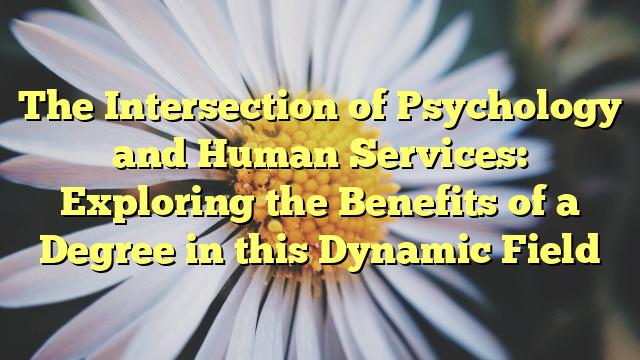The Intersection of Psychology and Human Services: Exploring the Benefits of a Degree in this Dynamic Field
The Intersection of Psychology and Human Services: Exploring the Benefits of a Degree in this Dynamic Field
Introduction
Psychology and human services are two fields that intersect in various ways, offering individuals a unique opportunity to make a positive impact on the lives of others. A degree in this dynamic field can open doors to a wide range of career options, allowing professionals to work in diverse settings and address the complex needs of individuals, families, and communities. In this article, we will explore the benefits of pursuing a degree in the intersection of psychology and human services.
1. Comprehensive Understanding of Human Behavior
One of the key benefits of studying psychology and human services is gaining a comprehensive understanding of human behavior. Through coursework and practical experiences, students learn about the various factors that influence human behavior, including biological, psychological, and social determinants. This knowledge equips professionals with the skills to assess and address the needs of individuals from a holistic perspective.
2. Versatile Career Opportunities
A degree in the intersection of psychology and human services opens up a wide range of career opportunities. Graduates can work in various settings, including mental health clinics, hospitals, schools, social service agencies, and nonprofit organizations. They can pursue careers as counselors, social workers, case managers, therapists, or community outreach coordinators, among others. The versatility of this degree allows professionals to choose a career path that aligns with their interests and passion.
3. Making a Positive Impact
Working in the field of psychology and human services provides individuals with the opportunity to make a positive impact on the lives of others. Professionals in this field often work with vulnerable populations, such as individuals with mental health issues, survivors of trauma, or those facing socioeconomic challenges. By providing support, guidance, and resources, professionals can help individuals overcome obstacles and improve their overall well-being.
4. Collaboration and Interdisciplinary Approach
The intersection of psychology and human services emphasizes collaboration and an interdisciplinary approach. Professionals in this field often work in teams, collaborating with colleagues from different disciplines, such as social work, counseling, and public health. This collaborative approach allows for a comprehensive assessment of individuals’ needs and the development of effective intervention strategies. By working together, professionals can leverage their diverse expertise to provide the best possible care and support to those in need.
5. Personal and Professional Growth
Pursuing a degree in the intersection of psychology and human services not only provides individuals with the opportunity to help others but also promotes personal and professional growth. Through coursework, field experiences, and interactions with diverse populations, students develop essential skills, such as empathy, active listening, critical thinking, and problem-solving. These skills are not only valuable in the field of psychology and human services but also transferable to various other professions.
6. Research and Evidence-Based Practice
Psychology and human services are fields that heavily rely on research and evidence-based practice. Professionals in this field are trained to critically evaluate research studies, apply evidence-based interventions, and contribute to the growing body of knowledge in the field. By staying up-to-date with the latest research findings, professionals can ensure that their practice is informed by the most effective and ethical approaches.
Conclusion
A degree in the intersection of psychology and human services offers individuals a unique opportunity to make a positive impact on the lives of others while also promoting personal and professional growth. The comprehensive understanding of human behavior, versatile career opportunities, ability to make a positive impact, emphasis on collaboration and interdisciplinary approach, personal and professional growth, and reliance on research and evidence-based practice are just a few of the many benefits of pursuing a degree in this dynamic field. If you are passionate about helping others and are interested in understanding and addressing the complex needs of individuals, families, and communities, a degree in the intersection of psychology and human services may be the right path for you.

